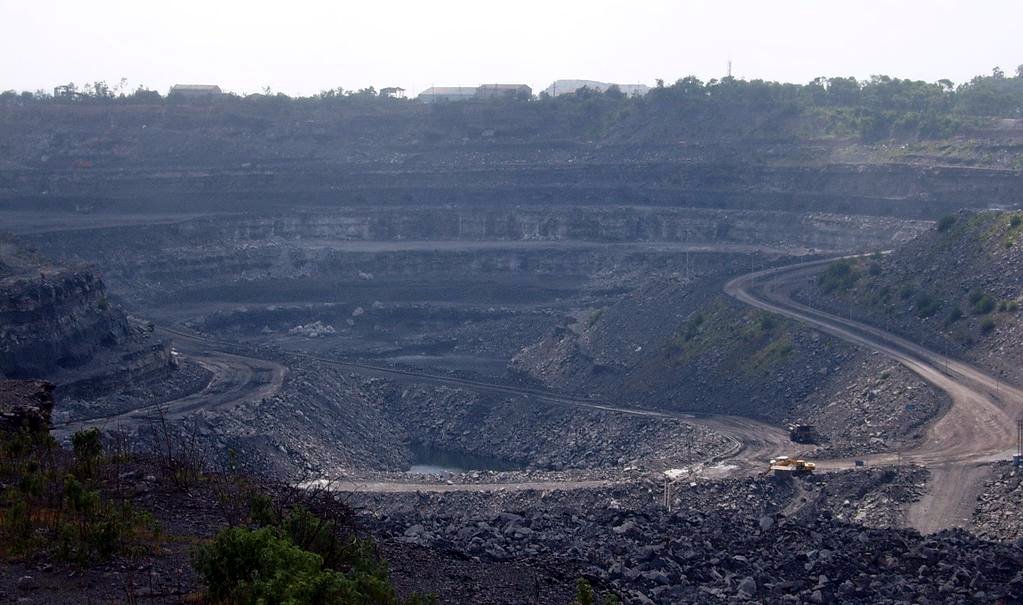|
Dukeville, North Carolina
Dukeville is a populated place in Rowan County, North Carolina, United States. It was built as a mill village along the banks of the Yadkin River in 1926 to house plant employees of the Buck Steam Station, owned by Duke Energy. In 2014, residents living near the Buck Steam Station in Dukeville were told that "coal ash pits near their homes could be leaching dangerous materials into groundwater." The issue became a documentary film for the 2017 Tribeca Film Festival The Tribeca Festival is an annual film festival organized by Tribeca Productions. It takes place each spring in New York City, showcasing a diverse selection of film, episodic, talks, music, games, art, and immersive programming. Tribeca was f .... References External links * * Environmental impact of the coal industry Water pollution in the United States Unincorporated communities in Rowan County, North Carolina Unincorporated communities in North Carolina {{RowanCountyNC-geo-stub ... [...More Info...] [...Related Items...] OR: [Wikipedia] [Google] [Baidu] |
Rowan County, North Carolina
Rowan County is a County (United States), county in the U.S. state of North Carolina that was formed in 1753, as part of the British Province of North Carolina. It was originally a vast territory with unlimited western boundaries, but its size was reduced to 524 sq mi after several counties were formed from Rowan County in the 18th and 19th centuries. As of the 2020 United States census, 2020 census, its population was 146,875. Its county seat, Salisbury, North Carolina, Salisbury, is the oldest continuously populated European-American town in the western half of North Carolina. Rowan County is located northeast of Charlotte, North Carolina, Charlotte, and is considered part of the Charlotte metropolitan area. History Early history The first Europeans to enter what is now Rowan County were members of the Spanish expedition of Juan Pardo (explorer), Juan Pardo in 1567. They established a fort and a mission in the native village of Guatari, believed to be located near the Yadkin Ri ... [...More Info...] [...Related Items...] OR: [Wikipedia] [Google] [Baidu] |
Mill Town
A mill town, also known as factory town or mill village, is typically a settlement that developed around one or more mills or factories, usually cotton mills or factories producing textiles. Europe Italy * ''Crespi d'Adda'', UNESCO World Heritage Site * ''Nuovo quartiere operaio'' in Schio * ''Villaggio Leumann'' a Collegno * ''Villaggio Frua'' in Saronno * ''Villaggio operaio della Filatura'' in Tollegno Poland Żyrardów The town grew out of a textile factory founded in 1833 by the sons of Feliks Lubienski, who owned the land where it was built. They brought in a specialist from France and his newly designed machines. He was French inventor, Philippe de Girard from Lourmarin. He became a director of the firm. The factory town developed during the 19th century into a significant textile mill town in Poland. In honour of Girard, 'Ruda Guzowska' as the original estate was called, was renamed Żyrardów, a toponym derived of the polonised spelling of Girard's name. Most of ... [...More Info...] [...Related Items...] OR: [Wikipedia] [Google] [Baidu] |
Yadkin River
The Yadkin River is one of the longest rivers in North Carolina, flowing . It rises in the northwestern portion of the state near the Blue Ridge Parkway's Thunder Hill Overlook. Several parts of the river are impounded by dams for water, power, and flood control. The river becomes the Pee Dee River at the confluence of the Uwharrie River south of the community of Badin and east of the town of Albemarle. The river then flows into South Carolina near Cheraw, which is at the Fall Line. The entirety of the Yadkin River and the Great Pee Dee River is part of the Yadkin-Pee Dee River Basin. Etymology The meaning of the word Yadkin, derived from ''Yattken'', or ''Yattkin'', a Siouan Indian word, is unknown. In Siouan terminology it may mean "big tree" or "place of big trees." Alternate names include: :Adkin River :Atkin River :Big Yadkin River :Reatkin River :Sapona River :Yatkin River Yadkin County, North Carolina, and its county seat, the town of Yadkinville, are named af ... [...More Info...] [...Related Items...] OR: [Wikipedia] [Google] [Baidu] |
Buck Steam Station
The Buck Steam Station is a 369- MW formerly coal-fired electrical power plant, owned by Duke Energy. There are also three natural gas-fueled combustion turbines at the location that provide an additional 93 MW (and which began operation in 1970), and two natural gas-fueled combined cycle turbines are planned for the near future. Remaining coal-fired units (IDs 5-9) were decommissioned in mid-2011 and April 2013, with only natural gas units (11C and 12C) remaining. History Steam plant The Buck Steam Station was built in 1926. It is named after a co-founder of Duke Energy, James Buchanan "Buck" Duke. The plant was originally three units, but a fourth was added when the company bought up an order cancelled by the Pentagon. Dukeville, North Carolina was built as a mill village along the banks of the Yadkin River in 1926 to house plant employees of the Buck Steam Station. In 2014, Dukeville residents were told that "coal ash pits near their homes could be leaching dangerous materia ... [...More Info...] [...Related Items...] OR: [Wikipedia] [Google] [Baidu] |
Duke Energy
Duke Energy Corporation is an American electric power and natural gas holding company headquartered in Charlotte, North Carolina. Overview Based in Charlotte, North Carolina, Duke Energy owns 58,200 megawatts of base-load and peak generation in the United States, which it distributes to its 7.2 million customers. The company has approximately 29,000 employees. Duke Energy's service territory covers with of distribution lines. Almost all of Duke Energy's Midwest generation comes from coal, natural gas, or oil, while half of its Carolinas generation comes from its nuclear power plants. During 2006, Duke Energy generated 148,798,332 megawatt-hours of electrical energy. Duke Energy Renewable Services (DERS), a subsidiary of Duke Energy, specializes in the development, ownership, and operation of various generation facilities throughout the United States. This segment of the company operates 1,700 megawatts of generation. 240 megawatts of wind generation were under construction and ... [...More Info...] [...Related Items...] OR: [Wikipedia] [Google] [Baidu] |
Fly Ash
Fly ash, flue ash, coal ash, or pulverised fuel ash (in the UK) plurale tantum: coal combustion residuals (CCRs)is a coal combustion product that is composed of the particulates (fine particles of burned fuel) that are driven out of coal-fired boilers together with the flue gases. Ash that falls to the bottom of the boiler's combustion chamber (commonly called a firebox) is called bottom ash. In modern coal-fired power plants, fly ash is generally captured by electrostatic precipitators or other particle filtration equipment before the flue gases reach the chimneys. Together with bottom ash removed from the bottom of the boiler, it is known as coal ash. Depending upon the source and composition of the coal being burned, the components of fly ash vary considerably, but all fly ash includes substantial amounts of silicon dioxide (SiO2) (both amorphous and crystalline), aluminium oxide (Al2O3) and calcium oxide (CaO), the main mineral compounds in coal-bearing rock strata. The u ... [...More Info...] [...Related Items...] OR: [Wikipedia] [Google] [Baidu] |
Tribeca Film Festival
The Tribeca Festival is an annual film festival organized by TriBeCa Productions, Tribeca Productions. It takes place each spring in New York City, showcasing a diverse selection of film, episodic, talks, music, games, art, and immersive programming. Tribeca was founded by Robert De Niro, Jane Rosenthal, and Craig Hatkoff in 2002 to spur the economic and cultural revitalization of Lower Manhattan following the September 11 attacks on the World Trade Center. Until 2020, the festival was known as the Tribeca Film Festival. Each year, the festival hosts over 600 screenings with approximately 150,000 attendees, and awards independent artists in 23 juried competitive categories. History The Tribeca Film Festival was founded in 2002 by Jane Rosenthal, Robert De Niro, and Craig Hatkoff, in response to the September 11 attacks on the World Trade Center (1973–2001), World Trade Center and the consequent loss of vitality in the Tribeca neighborhood in Lower Manhattan. The inaugural ... [...More Info...] [...Related Items...] OR: [Wikipedia] [Google] [Baidu] |
Environmental Impact Of The Coal Industry
The health and environmental impact of the coal industry includes issues such as land use, waste management, water and air pollution, caused by the coal mining, processing and the use of its products. In addition to atmospheric pollution, coal burning produces hundreds of millions of tons of solid waste products annually, including fly ash, bottom ash, and flue-gas desulfurization sludge, that contain mercury, uranium, thorium, arsenic, and other heavy metals. Coal is the largest contributor to the human-made increase of carbon dioxide in Earth's atmosphere. There are severe health effects caused by burning coal. According to a report by the World Health Organization in 2008, coal particulates pollution are estimated to shorten approximately 10,000 lives annually worldwide. A 2004 study commissioned by environmental groups, but contested by the United States Environmental Protection Agency, concluded that coal burning costs 24,000 lives a year in the United States. More re ... [...More Info...] [...Related Items...] OR: [Wikipedia] [Google] [Baidu] |
Water Pollution In The United States
Water pollution in the United States is a growing problem that became critical in the 19th century with the development of mechanized agriculture, mining, and industry, although laws and regulations introduced in the late 20th century have improved water quality in many water bodies. Extensive industrialization and rapid urban growth exacerbated water pollution as a lack of regulation allowed for discharges of sewage, toxic chemicals, nutrients and other pollutants into surface water. In the early 20th century, communities began to install drinking water treatment systems, but control of the principal pollution sources—domestic sewage, industry, and agriculture—was not effectively addressed in the US until the later 20th century. These pollution sources can affect both groundwater and surface water. Multiple pollution incidents such as the Kingston Fossil Plant coal fly ash slurry spill (2008) and the Deepwater Horizon oil spill (2010) have left lasting impacts on water qual ... [...More Info...] [...Related Items...] OR: [Wikipedia] [Google] [Baidu] |
Unincorporated Communities In Rowan County, North Carolina
Unincorporated may refer to: * Unincorporated area, land not governed by a local municipality * Unincorporated entity, a type of organization * Unincorporated territories of the United States, territories under U.S. jurisdiction, to which Congress has determined that only select parts of the U.S. Constitution apply * Unincorporated association Unincorporated associations are one vehicle for people to cooperate towards a common goal. The range of possible unincorporated associations is nearly limitless, but typical examples are: :* An amateur football team who agree to hire a pitch onc ..., also known as voluntary association, groups organized to accomplish a purpose * ''Unincorporated'' (album), a 2001 album by Earl Harvin Trio {{disambig ... [...More Info...] [...Related Items...] OR: [Wikipedia] [Google] [Baidu] |




(NRCS_Photo_Gallery).jpg)